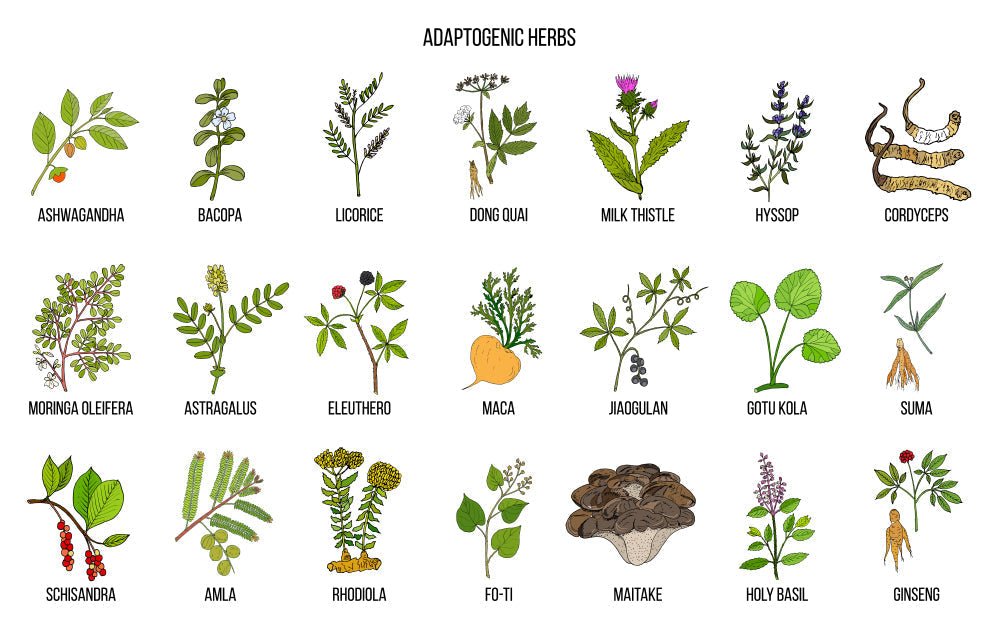Your cart is empty
Free shipping on all US orders


Free shipping on all orders

If you're like most people, you probably think of stress as something negative that you'd like to avoid. While it's true that too much stress can be harmful, a certain amount of stress is actually necessary for your body to function properly. Your body responds to stress by releasing hormones like adrenaline and cortisol, which help you to think more clearly and react more quickly in a dangerous situation.
The problem is that, in our fast-paced, modern world, we're constantly bombarded with stressors like traffic, deadlines, and family conflict. As a result, our bodies are in a constant state of "fight or flight," which can lead to problems like anxiety, insomnia, and even heart disease.
That's where adaptogens come in. These herbs help your body to cope with stress by regulating the release of stress hormones.
And trust us, your body definitely does need help. Stress is incredibly harmful to the body and can manifest in a variety of ways, from mental health issues to physical illnesses.
While adaptogens don't eliminate stressors outright, they can help you better manage them so that they don't take over your life.
There are a ton of different adaptogenic herbs out there, each with its own unique set of benefits. In this blog post, we'll introduce you to some of the most popular adaptogens and their benefits so that you can decide if they're right for you.
Adaptogens are a class of herbs that help the body cope with physical, chemical, and biological stressors. They work by normalizing imbalances in the body caused by stress and help to restore equilibrium. In other words, they help your body function optimally despite being under stress. The concept of adaptogenic herbs was first coined in the 1940s by Russian scientist and doctor Nicolai V. Lazarev who was studying the body's response to stressors. He observed that some plants were able to thrive in harsh environments that would kill other plants. Lazarev theorized that these plants must have some mechanism for protecting themselves against stressors and he named them "adaptogens."
These herbs haven't just surfaced either; they have been used for centuries in traditional Chinese and Indian medicine to help the body cope with stress. And unlike other herbs, adaptogens don't just target one specific organ or system; instead, they work on a much deeper level to support the entire body.
First, adaptogens help to regulate the release of stress hormones like adrenaline and cortisol. This helps to keep your body from going into "fight or flight" mode too often.
Second, adaptogens help to improve the function of the adrenal glands so that they're better able to handle stress.
And third, adaptogens help to boost the immune system so that your body is better able to fight off illness.
With that in mind, we can now discuss some of the noteworthy benefits of adaptogenic herb consumption.
If you're like most people, you probably start to feel a bit sluggish as the afternoon wears on. But instead of reaching for another cup of coffee, you might want to try an adaptogen. Unlike stimulants like caffeine which cause a peak and a crash, adaptogens don't cause an immediate spike in energy levels. Instead, they help to restore the body's natural energy production. As a result, adaptogens can be an effective way to fight fatigue and boost energy levels over time. Plus, the likelihood of experiencing jitters is extremely low when using an adaptogen.
In addition, adaptogens have been shown to boost ATP production, the energy source that fuels the body's cells. As a result, these unique herbs can be a helpful tool for naturally allowing the body to rapidly replenish energy stores.
The only exception to the disadvantage of caffeine would have to be Dawn To Dusk, a sustained-release energy booster containing a no-crash version of caffeine that can keep you powered for up to 12 hours.
It seems as though we're late to the party. Adaptogens have been used for centuries in Traditional Chinese Medicine and Ayurveda to help the body cope with stress.
Modern science has now begun to unlock the mechanisms behind how adaptogens work, and it seems that these herbs are able to modulate stress hormones like catecholamines (adrenalin and noradrenalin) and cortisol.
When we're stressed, our bodies release these hormones into the bloodstream to help us deal with the perceived threat. However, chronic stress can lead to imbalances in these hormones, which can in turn contribute to anxiety and other health problems.
Adaptogens seem to help restore balance by regulating the production and release of these stress hormones. As a result, they can help reduce anxiety and improve overall mental well-being.
In turn, even mood and sleep patterns can be improved with a reduction in excitatory neurotransmitters.
When most people think of immunity, they picture an impervious iron shield that repels infection. It is actually not static and comprises microscopic particles that are dynamic throughout our body.
Adaptogens are a unique class of herbs that have been shown to help boost immunity. Unlike other immunity-boosting agents, adaptogens work by modulating the immune response, rather than simply stimulating it.
Modulation refers to either increasing or decreasing the immune response, depending on the scenario. For example, many auto-immune disorders are caused by a hyperactive immune system; so much so that it attacks the host's own body.
This modulation helps to improve the body's overall defenses, rather than just providing a temporary immunity boost.
In addition, adaptogens have been shown to help improve the function of white blood cells and other immunity-related cells to better target pathogens. As a result, they offer a more comprehensive approach to immunity than other solely immunity-boosting agents.
This benefit ties in with the previous point. An elevated immune system usually correlates to more significant inflammatory processes. Not necessarily a good thing, as it may become "trigger happy", attacking the wrong things in the process.

Adaptogens have anti-inflammatory properties that can help to reduce inflammation throughout the body and combat the effects of an overactive immune system. Inflammation is a natural response to injury or illness, but chronic inflammation can lead to a host of health problems like heart disease, arthritis, and diabetes. By reducing inflammation, adaptogens can help to protect against these chronic diseases.
Whether you're an athlete or just trying to improve how much exercise your body can tolerate, the adaptogens can help you get there.
Adaptogens such as ginseng can improve power output and help to reduce fatigue. In fact, one study showed that ginseng was able to improve physical performance in athletes by 11-12%.
Similarly, endurance, or the time it takes to fatigue is also improved by taking adaptogens. This is likely due to the ability of these herbs to reduce perceived stress and improve blood flow throughout the body. Combined with its energy-enhancing properties, you can see how better physical performance should be expected.
There are many adaptogens that have been discovered thus far. No doubt, more will come to light as our understanding of the properties of plants and herbs grow.
But so far, there are a few standouts that merit the chunk of our attention and research. Excellent ones to look for include:
Ginseng was one of the first adaptogens to rise to prominence during the early days of research. And it continues to be one of the most popular and well-known herbs today.

There are several different varieties, but the two most commonly used are Asian (or Korean) ginseng (Panax ginseng) and American ginseng (Panax quinquefolius). Both are excellent herbs with a long history of traditional use.
Even Siberian Ginseng (not a true ginseng, but Eleutherococcus) has assumed the moniker and delivers many of the same benefits.
Ginsenosides are the active components in ginseng that are responsible for its many health benefits. These include improved mental well-being, better physical performance, increased energy, and enhanced immunity.
Ginseng is even used as a purported aphrodisiac, allegedly because of its ability to increase desire and blood flow to the nether regions.
The OG nootropic, back in the day, ginkgo was the go-to supplement when trying to improve focus, memory, or retention.
Ginkgo biloba is extracted from the leaves of the ginkgo tree, one of the oldest living trees on Earth. It has been used in traditional Chinese medicine for millennia to treat a variety of ailments.

It's thought that ginkgo works by improving blood circulation throughout the body, including to the brain. This increased blood flow can help to improve cognitive function, and memory, relieve anxiety, and yes- boost energy from the enhanced mental blood flow.
One of the newer kids on the block (NKOTB?) and most well-known adaptogens these days, ashwagandha actually has a long history of traditional use in Ayurvedic medicine. It's an excellent all-around herb with a variety of benefits for mental and physical health.
The main active component in ashwagandha is called withanolides, which have shown promise in treating hypogonadism in males and boosting fertility, with compelling results.
Besides that, it also possesses strong anxiolytic actions and can be helpful in promoting sleep, especially when combined with melatonin.
Another ancient adaptogen, this herb can only be found growing in the frigid mountains of Eurasia. It is sometimes referred to as "golden root" or "arctic root." Rhodiola rosea has been used in traditional medicine for centuries to help with a variety of complaints.

These days, it's commonly used as a cognitive enhancer, energy booster, and performance aid to athletes that believe it assists with exercise capacity and post-workout recovery. It can also help to improve mental well-being and reduce stress.
This unique herb is actually not an herb at all, but a parasitic fungus that grows on caterpillars in the mountainous regions of China and Tibet. It has been used in traditional Chinese medicine for over 2,000 years to treat various respiratory and kidney ailments.

Cordyceps is another energy-enhancing adaptogen that can help to improve athletic performance as well as increase mental clarity, focus, and memory.
These are just a few of the many adaptogenic herbs that have shown promise in human clinical trials. While more research is needed to confirm the true extent of their efficacy, these herbs have been used safely for centuries and are definitely worth trying if you're looking for a natural way to improve your health and well-being.
While adaptogens are generally considered safe for most people, there are a few potential side effects to be aware of. Adaptogens may interact with certain medications, so if you’re taking any prescription drugs, it’s always best to speak with your doctor before taking an adaptogen supplement.
In addition, pregnant or breastfeeding women should avoid taking adaptogens at all unless recommended by a healthcare professional.
It is fairly safe to say that If you are looking for a way to improve your life and well-being, consider trying an adaptogen. There are many different kinds available, each with its own unique benefit profile.
While some have been studied more extensively than others, all of them have the huge potential to really change your life for the better- so why not give them a try?